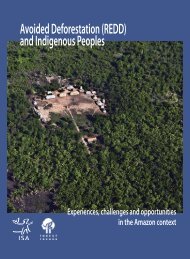BASELINE STUDY 5, Thailand - Forest Trends
BASELINE STUDY 5, Thailand - Forest Trends
BASELINE STUDY 5, Thailand - Forest Trends
You also want an ePaper? Increase the reach of your titles
YUMPU automatically turns print PDFs into web optimized ePapers that Google loves.
6. THAI FOREST PRODUCTS MANUFACTURING INDUSTRY<br />
6.1 Overview<br />
The FAO estimates that two thirds of the 2,500 wood-based industries operating in <strong>Thailand</strong> are furniture producers<br />
(FAO 2009:61-62). These manufacturers employ upwards of 260,000 people (11% of total manufacturing),<br />
and paid out approximately US$560 million in wages and salaries. In addition, FAO estimates that there<br />
were 3,000 timber traders, 242 smaller scale sawmills, over 5,000 smaller scale woodworking operations, 22<br />
particle board mills, 4 hardboard mills, 7 medium-density fiberboard mills in 2004. Assuming these figures have<br />
stayed roughly stable since 2004, plantations and wood processing can thus be considered as a strategic sector<br />
for the Thai economy.<br />
With increasing liberalization and decentralization trends in <strong>Thailand</strong>, the private sector plays a larger role in the<br />
wood sector, furthering the gap between the public and private wood sector in terms of economic versus conservation<br />
goals. These divisions are in part represented by the split between old conservation laws governing<br />
the RFD and more recent regulations for the private wood sector, such as with customs and certification<br />
schemes.<br />
The private sector procures wood from several sources. For domestic plantation wood, companies can purchase<br />
directly from smallholder tree farmers (as part of the RFD-sponsored programs), or directly from FIO (e.g.<br />
teak). For natural wood of higher quality necessary for export trade, Thai companies import wood from other<br />
countries.<br />
Due to the more restrictive trading environment in <strong>Thailand</strong> compared to other countries in the region, Thai<br />
wood companies are voicing increasing concerns, and even relocating to other countries such as China and Malaysia,<br />
to secure cheaper raw materials and labor for export-oriented manufacturing.<br />
All exported wood from <strong>Thailand</strong> must be value-added. No logs of natural trees of conservation value can be<br />
legally exported. The one exception is that the FIO can legally export logs, usually teak (often, but not exclusively,<br />
from plantations). Technically, the Minister of the Ministry of Commerce can give an exception to this law<br />
and allow another agency other than FIO to export logs. So far, however, this has not yet occurred. Nonnatural/plantation<br />
tree species of no conservation value, such as rubber and eucalyptus, can be exported in log<br />
form, however.<br />
6.2 Woodchips and Pulp and Paper Manufacturing<br />
The largest segment of the wood processing industry in <strong>Thailand</strong> in terms of volume is clearly pulp and paper,<br />
followed by sawmilling and particleboard. The pulp and paper sector consumes almost all of the annual eucalyptus<br />
woodchip production in <strong>Thailand</strong>, with some volumes exported as woodchips. Overall pulp manufacturing<br />
in <strong>Thailand</strong> is currently about 1.25 million metric tonnes per year (RISI 2008). However, some of these companies<br />
(such as Panjapol Pulp Industry) rely predominantly upon access to recycled sources. The lack of capacity<br />
expansion in the Thai pulp sector has facilitated modest increases in woodchip exports in recent years.<br />
© EU FLEGT Facility, <strong>BASELINE</strong> <strong>STUDY</strong> 5, <strong>Thailand</strong>: Overview of <strong>Forest</strong> Law Enforcement, Governance and Trade, July 2011<br />
This Action is funded by the European Union and the governments of Finland, France, Germany, the Netherlands, Spain and the UK. The views expressed herein<br />
can in no way be taken to reflect the official opinion of the European Union.<br />
www.euflegt.efi.int<br />
40
















